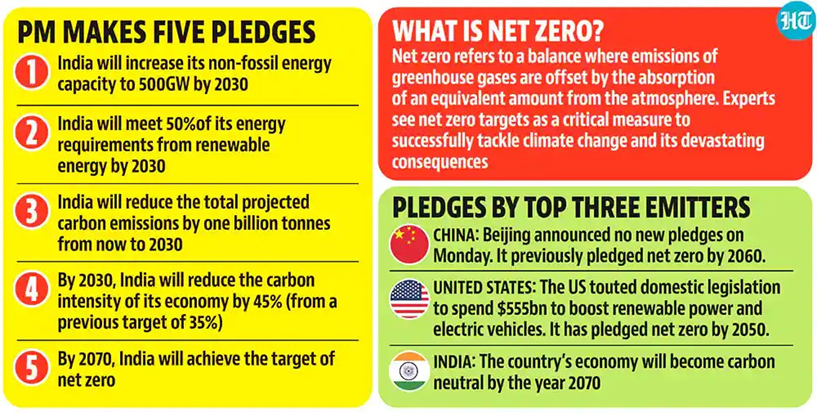Paris Agreement and its Failure to Address the Climate Change
For Prelims: Paris Agreement, India’s Nationally Determined Contribution Targets, United Nations Framework Convention on Climate Change, State of the Global Climate 2022 report
For Mains: Paris Agreement: Its failures and Way Forward
Why in News?
Recently, the World Meteorological Organization (WMO) released its State of the Global Climate 2022 report which pointed out that the Paris Agreement on Climate Change has been ineffective in fulfilling its agenda.
- The Paris Agreement that serves as the centre point of ongoing global negotiation on climate change was inked in 2015.
What has the Report Highlighted on Performance of Paris Agreement?
- Inability to Achieve Climate Related Goals:
- After signing of the Agreement, the last eight years (2015-2022) have consecutively been the warmest years on record globally.
- The situation could have been far worse if the La Nina weather event had not occurred in the past three years, which has a cooling effect on the weather system.
- Globally updated Nationally Determined Contributions (NDCs) to limit global warming to 1.5°C have failed even to achieve 2°C target.
- The Paris Agreement has not been able to equitably phase out fossil fuels predominantly responsible for the climate crisis.
- Neither the NDCs nor the disaster risk reduction and climate risk management plans are in place to combat climate-induced extreme weather phenomena.
- After signing of the Agreement, the last eight years (2015-2022) have consecutively been the warmest years on record globally.
- Suggestions:
- To complement the Paris Agreement, a new global framework in the form of a Fossil Fuel Treaty should be introduced.
- Most industrialised and emission-belching countries should be made to follow the Paris Agreement’s commitments.
- Accelerated climate action with deeper, faster emissions cuts is needed as tools, the knowledge, and the solutions are available.
- There is a need to undertake massively scaled-up investments in adaptation and resilience, particularly for the most vulnerable countries and communities who have done the least to cause the crisis.
What is the Paris Agreement on Climate Change?
- It is a legally binding global agreement under the United Nations Framework Convention on Climate Change (UNFCCC) that was adopted in 2015. It was adopted in UNFCCC COP21.
- It aims to combat climate change and limit global warming to well below 2o C above pre-industrial levels, with an ambition to limit warming to 1.5o C.
- It replaced the Kyoto Protocol which was an earlier agreement to deal with climate change.
- The Paris Agreement sets out a framework for countries to work together to reduce greenhouse gas emissions, adapt to the impacts of climate change, and provide support to developing countries in their efforts to address climate change.
- Under the Paris Agreement, each country is required to submit and update their NDCs every 5 years, outlining their plans for reducing greenhouse gas emissions and adapting to climate change.
- NDCs are pledges made by countries to reduce their greenhouse gas emissions and to adapt to the impacts of climate change.
- India’s updated NDCs:
UPSC Civil Services Examination, Previous Year Questions (PYQs)
Prelims:
Q. The term ‘Intended Nationally Determined Contributions’ is sometimes seen in the news in the context of (2016)
(a) pledges made by the European countries to rehabilitate refugees from the war-affected Middle East
(b) plan of action outlined by the countries of the world to combat climate change
(c) capital contributed by the member countries in the establishment of Asian Infrastructure Investment Bank
(d) plan of action outlined by the countries of the world regarding Sustainable Development Goals
Answer: b
Q. With reference to the Agreement at the UNFCCC Meeting in Paris in 2015, which of the following statements is/are correct? (2016)
- The Agreement was signed by all the member countries of the UN and it will go into effect in 2017.
- The Agreement aims to limit the greenhouse gas emissions so that the rise in average global temperature by the end of this century does not exceed 2°C or even 1.5°C above pre-industrial levels.
- Developed countries acknowledged their historical responsibility in global warming and committed to donate $1000 billion a year from 2020 to help developing countries to cope with climate change.
Select the correct answer using the code given below.
(a) 1 and 3 only
(b) 2 only
(c) 2 and 3 only
(d) 1, 2 and 3
Answer: b
Mains:
Q. ‘Climate change’ is a global problem. How India will be affected by climate change? How Himalayan and coastal states of India will be affected by climate change? (2017)
Q. Describe the major outcomes of the 26th session of the Conference of the Parties (COP) to the United Nations Framework Convention on Climate Change (UNFCCC). What are the commitments made by India in this conference? (2021)
